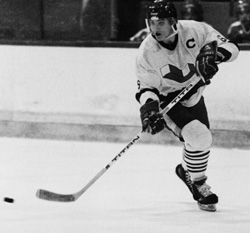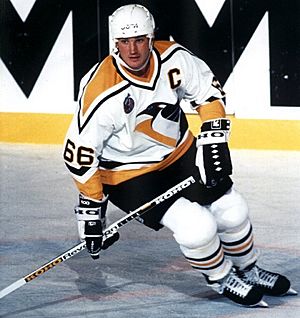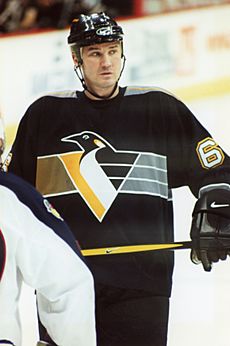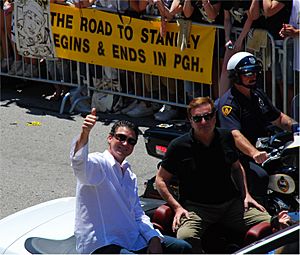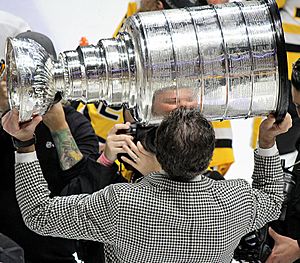Mario Lemieux facts for kids
Quick facts for kids Mario LemieuxOC CQ |
||||||||||||||||||||||||||||||||||||||||
|---|---|---|---|---|---|---|---|---|---|---|---|---|---|---|---|---|---|---|---|---|---|---|---|---|---|---|---|---|---|---|---|---|---|---|---|---|---|---|---|---|
| Hockey Hall of Fame, 1997 | ||||||||||||||||||||||||||||||||||||||||
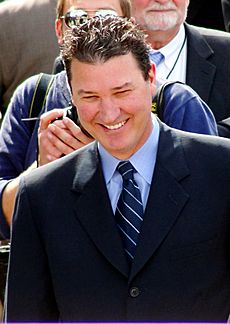
Lemieux in 2012
|
||||||||||||||||||||||||||||||||||||||||
| Born | October 5, 1965 Montreal, Quebec, Canada |
|||||||||||||||||||||||||||||||||||||||
| Height | 6 ft 4 in (193 cm) | |||||||||||||||||||||||||||||||||||||||
| Weight | 235 lb (107 kg; 16 st 11 lb) | |||||||||||||||||||||||||||||||||||||||
| Position | Centre | |||||||||||||||||||||||||||||||||||||||
| Shot | Right | |||||||||||||||||||||||||||||||||||||||
| Played for | Pittsburgh Penguins | |||||||||||||||||||||||||||||||||||||||
| National team | ||||||||||||||||||||||||||||||||||||||||
| NHL Draft | 1st overall, 1984 Pittsburgh Penguins |
|||||||||||||||||||||||||||||||||||||||
| Playing career | 1984–1997 2000–2006 |
|||||||||||||||||||||||||||||||||||||||
|
Medal record
|
||||||||||||||||||||||||||||||||||||||||
Mario Lemieux (born October 5, 1965) is a Canadian former professional ice hockey player and one of the most famous figures in the sport's history. He played his entire 17-season National Hockey League (NHL) career with the Pittsburgh Penguins from 1984 to 2006. He later bought the team in 1999 when it was facing money problems.
Fans and experts call him "the Magnificent One" and "Super Mario" because of his amazing skill, size, and creativity on the ice. He is often considered one of the greatest hockey players of all time.
Lemieux led the Penguins to two Stanley Cup championships in a row in 1991 and 1992. As the team's owner, he won three more championships in 2009, 2016, and 2017. He is the only person to have his name on the Stanley Cup as both a player and an owner. He also won an Olympic gold medal with Team Canada in 2002.
Throughout his career, Lemieux won many awards. He won the Art Ross Trophy as the league's top scorer six times and the Hart Memorial Trophy as the league's most valuable player three times. Despite serious health problems, including Hodgkin's lymphoma and chronic back pain, he always played at an elite level. He retired twice but came back both times, showing incredible determination.
Contents
Early Life and Junior Hockey
Mario Lemieux was born in Montreal, Canada. He grew up in a working-class family with his two older brothers, Alain and Richard. He started playing hockey at age three in his family's basement, using kitchen spoons for sticks and bottle caps for pucks. His father even built an ice rink in their front yard so the boys could practice as much as possible.
Lemieux began his junior hockey career with the Laval Voisins in the Quebec Major Junior Hockey League (QMJHL). He was an incredible scorer. In the 1983–84 season, he broke the league record for points in a season with 282 points (133 goals and 149 assists) in just 70 games. In his last regular-season game, he needed three goals to tie a record held by the legendary Guy Lafleur. He scored six goals instead.
Because of his amazing talent, the Pittsburgh Penguins chose him as the first overall pick in the 1984 NHL Entry Draft. At the time, the Penguins were not a very good team and had trouble attracting fans. Lemieux was about to change all of that.
NHL Playing Career
1984–1988: A Star is Born
Lemieux made an immediate impact in the NHL. In his very first game on October 11, 1984, he stole the puck from Hall of Fame defenseman Ray Bourque on his first shift and scored with his first shot. He went on to score 100 points in his first season and won the Calder Memorial Trophy as the rookie of the year.
In his second season, he scored 141 points and won the Lester B. Pearson Award as the league's best player, as voted by other players. By the 1987–88 season, he scored 168 points to win his first Art Ross Trophy as the league's top scorer, ending Wayne Gretzky's seven-year streak.
1988–1992: Reaching the Top
In the 1988–89 season, Lemieux had one of the greatest seasons in NHL history, scoring 199 points (85 goals and 114 assists). He became the only player to score a goal in all five possible situations in a single game: even-strength, power-play, shorthanded, penalty shot, and on an empty net.
Despite his personal success, Lemieux was held back by injuries. He had a serious back injury that required surgery and caused him to miss 50 games in the 1990–91 season. But he returned for the playoffs and led the Penguins to their first-ever Stanley Cup championship. He won the Conn Smythe Trophy as the most valuable player of the playoffs. The next year, he did it again, leading the Penguins to a second straight Stanley Cup and winning another Conn Smythe Trophy.
1992–1997: Overcoming Health Challenges
In January 1993, at the height of his career, Lemieux announced he had been diagnosed with Hodgkin's lymphoma, a type of cancer. He had to undergo radiation treatments, which caused him to miss two months of the season. Incredibly, on the same day as his final treatment, he flew to Philadelphia to play in a game, where he scored a goal and an assist.
He returned to lead the league in scoring with 160 points in just 60 games, winning the Art Ross Trophy and the Hart Memorial Trophy. He also received the Bill Masterton Memorial Trophy for his perseverance and dedication to hockey.
After more back problems, Lemieux took a year off from hockey. He returned in the 1995–96 season and once again won the scoring title and the Hart Trophy. In 1997, tired from his health battles, Lemieux retired from hockey at age 31. He was so respected that he was inducted into the Hockey Hall of Fame that same year, without the usual three-year waiting period.
Owner and Player: The Comeback
Saving the Penguins
After Lemieux retired, the Penguins faced serious financial problems and were forced to declare bankruptcy in 1998. The team was in danger of moving to another city or shutting down completely.
Lemieux stepped in to save the team. The Penguins owed him millions of dollars in salary he had agreed to delay receiving. He came up with a plan to turn that debt into ownership of the team. In 1999, his plan was approved, and he became the first former player to become the majority owner of his old team. He promised to keep the Penguins in Pittsburgh and worked hard to make the team financially stable again.
2000–2006: Return to the Ice
In late 2000, Lemieux stunned the hockey world by announcing he was coming out of retirement. He said one reason was that his young son, Austin, had never seen him play. On December 27, 2000, he returned to the ice and scored a goal and two assists in his first game back.
Even in his late 30s, Lemieux was one of the best players in the league. He played for five more seasons, though injuries continued to limit his playing time. He also served as the captain for Team Canada at the 2002 Winter Olympics, leading them to their first gold medal in 50 years.
On January 24, 2006, Lemieux retired for the second and final time. He was diagnosed with atrial fibrillation, a condition that causes an irregular heartbeat, and felt he could no longer play at the high level he expected of himself.
Life After Playing
As the owner of the Penguins, Lemieux continued to have great success. He was key in getting a new arena built in Pittsburgh, ensuring the team would stay in the city for many years. Under his ownership, the team drafted superstar Sidney Crosby and won three more Stanley Cups in 2009, 2016, and 2017.
In 2021, Lemieux sold a controlling interest in the team but remains a part-owner and chairman of the board.
Charity Work
In 1993, the same year he was diagnosed with cancer, Lemieux started the Mario Lemieux Foundation to raise money for medical research. His foundation also creates "Austin's Playrooms" in hospitals, which are special play areas for children who are patients or visiting family members. This idea came after his own son, Austin, was born prematurely and spent a lot of time in the hospital.
Legacy
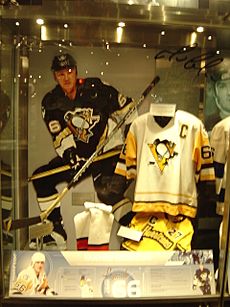
Mario Lemieux is remembered as a hero in Pittsburgh for saving the Penguins twice—first as a player who made them champions, and second as an owner who kept them from leaving the city. His combination of size, skill, and vision was unlike any other player. Many experts wonder how many more records he would have set if not for his health problems.
Wayne Gretzky once said, "You don't replace players like Mario Lemieux." A statue of Lemieux was placed outside the Penguins' arena in 2012 to honor his incredible career and impact on the city of Pittsburgh.
Career Statistics
Regular Season and Playoffs
Bold indicates led league
| Regular season | Playoffs | |||||||||||||
|---|---|---|---|---|---|---|---|---|---|---|---|---|---|---|
| Season | Team | League | GP | G | A | Pts | PIM | GP | G | A | Pts | PIM | ||
| 1980–81 | Montreal-Concordia | QMAAA | 47 | 62 | 62 | 124 | 127 | 3 | 2 | 5 | 7 | 8 | ||
| 1981–82 | Laval Voisins | QMJHL | 64 | 30 | 66 | 96 | 22 | — | — | — | — | — | ||
| 1982–83 | Laval Voisins | QMJHL | 66 | 84 | 100 | 184 | 76 | 12 | 14 | 18 | 32 | 18 | ||
| 1983–84 | Laval Voisins | QMJHL | 70 | 133 | 149 | 282 | 97 | 14 | 29 | 23 | 52 | 29 | ||
| 1983–84 | Laval Voisins | M-Cup | — | — | — | — | — | 3 | 1 | 2 | 3 | 0 | ||
| 1984–85 | Pittsburgh Penguins | NHL | 73 | 43 | 57 | 100 | 54 | — | — | — | — | — | ||
| 1985–86 | Pittsburgh Penguins | NHL | 79 | 48 | 93 | 141 | 43 | — | — | — | — | — | ||
| 1986–87 | Pittsburgh Penguins | NHL | 63 | 54 | 53 | 107 | 57 | — | — | — | — | — | ||
| 1987–88 | Pittsburgh Penguins | NHL | 77 | 70 | 98 | 168 | 92 | — | — | — | — | — | ||
| 1988–89 | Pittsburgh Penguins | NHL | 76 | 85 | 114 | 199 | 100 | 11 | 12 | 7 | 19 | 16 | ||
| 1989–90 | Pittsburgh Penguins | NHL | 59 | 45 | 78 | 123 | 78 | — | — | — | — | — | ||
| 1990–91 | Pittsburgh Penguins | NHL | 26 | 19 | 26 | 45 | 30 | 23 | 16 | 28 | 44 | 16 | ||
| 1991–92 | Pittsburgh Penguins | NHL | 64 | 44 | 87 | 131 | 94 | 15 | 16 | 18 | 34 | 2 | ||
| 1992–93 | Pittsburgh Penguins | NHL | 60 | 69 | 91 | 160 | 38 | 11 | 8 | 10 | 18 | 10 | ||
| 1993–94 | Pittsburgh Penguins | NHL | 22 | 17 | 20 | 37 | 32 | 6 | 4 | 3 | 7 | 2 | ||
| 1995–96 | Pittsburgh Penguins | NHL | 70 | 69 | 92 | 161 | 54 | 18 | 11 | 16 | 27 | 33 | ||
| 1996–97 | Pittsburgh Penguins | NHL | 76 | 50 | 72 | 122 | 65 | 5 | 3 | 3 | 6 | 4 | ||
| 2000–01 | Pittsburgh Penguins | NHL | 43 | 35 | 41 | 76 | 18 | 18 | 6 | 11 | 17 | 4 | ||
| 2001–02 | Pittsburgh Penguins | NHL | 24 | 6 | 25 | 31 | 14 | — | — | — | — | — | ||
| 2002–03 | Pittsburgh Penguins | NHL | 67 | 28 | 63 | 91 | 43 | — | — | — | — | — | ||
| 2003–04 | Pittsburgh Penguins | NHL | 10 | 1 | 8 | 9 | 6 | — | — | — | — | — | ||
| 2005–06 | Pittsburgh Penguins | NHL | 26 | 7 | 15 | 22 | 16 | — | — | — | — | — | ||
| NHL totals | 915 | 690 | 1,033 | 1,723 | 834 | 107 | 76 | 96 | 172 | 87 | ||||
International
| Year | Team | Event | GP | G | A | Pts | PIM | |
|---|---|---|---|---|---|---|---|---|
| 1983 | Canada | WJC | 7 | 5 | 5 | 10 | 12 | |
| 1985 | Canada | WC | 9 | 4 | 6 | 10 | 2 | |
| 1987 | Canada | CC | 9 | 11 | 7 | 18 | 8 | |
| 2002 | Canada | OLY | 5 | 2 | 4 | 6 | 0 | |
| 2004 | Canada | WCH | 6 | 1 | 4 | 5 | 2 | |
| Junior totals | 7 | 5 | 5 | 10 | 12 | |||
| Senior totals | 29 | 18 | 21 | 39 | 12 | |||
Awards
| Award | Year |
|---|---|
| Hockey Hall of Fame | 1997 |
| Stanley Cup | 1991, 1992, *2009, *2016, *2017 |
| Conn Smythe Trophy | 1991, 1992 |
| Art Ross Trophy | 1988, 1989, 1992, 1993, 1996, 1997 |
| Ted Lindsay Award | 1986, 1988, 1993, 1996 |
| Hart Memorial Trophy | 1988, 1993, 1996 |
| NHL All-Star Game MVP | 1985, 1988, 1990 |
| NHL All-Rookie team | 1985 |
| Calder Memorial Trophy | 1985 |
| Bill Masterton Trophy | 1993 |
* Stanley cup champion as an owner.
Images for kids
-
Lemieux's star on Canada's Walk of Fame
See also
 In Spanish: Mario Lemieux para niños
In Spanish: Mario Lemieux para niños
 | Audre Lorde |
 | John Berry Meachum |
 | Ferdinand Lee Barnett |


